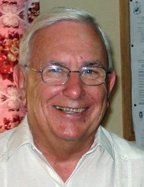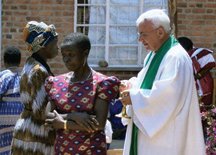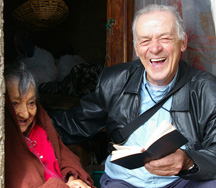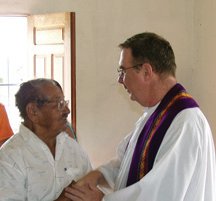A priest in global mission
By Fr. Jack Lynch, S.F.M.
September/October 2009
Return to Table of Contents
Print Article
This year Pope Benedict announced the Year of the Priest beginning on June 19—the feast of St. John Vianney—until June 19, 2010. Its purpose is “to deepen the commitment of all priests to interior renewal for the sake of a more forceful and incisive witness to the Gospel in today’s world.”
As a priest, I love the description of the Jesuit theologian Karl Rahner, “The priest is a man chosen from among men, a member of the church, a Christian. Remaining man and Christian he begins to speak to you the word of God.”
The ordained priest is called to be a servant of the Word of God at the service of the church community. The greatest privilege we have is to celebrate the Eucharist with a community of believers who follow the teachings of Jesus to “do this in memory of me.”
From August 10 to 16 this year, the Catholic bishops of 17 episcopal conferences in Asia gathered in the Philippines to reflect on “Living the Eucharist in Asia.” Some of their conclusions address the intimate link between Eucharist, priesthood, mission and the ongoing commitment and lifestyle of the entire church. Listen to what the Asian bishops said:
“Our (Eucharistic) celebrations should generate in everyone the courage to build authentic communities that reconcile, forgive and minister to the poor and marginalized.”
“We cannot celebrate the Eucharist and at the same time maintain, practice or tolerate discrimination based on religion or race, culture or language, caste or class. If we are grafted into the Eucharistic Lord, we will reach out and become bridge builders in a world that is becoming increasingly divisive.”
“The celebration of the Eucharist ends with the call to mission: ‘Go, you are sent forth.’ The Eucharist must be lived by becoming communities of loving concern, hospitality, selfless service to the poor, the excluded and downtrodden”.
Any priest or anyone considering priesthood who wants to be principal celebrant at the Eucharist has to find these reflections most challenging. They speak directly to the life and lifestyle of the priest. To live the Eucharist is to live in faith, being part of a dynamic church committed to living out the values of the Reign of God as announced by Jesus and celebrated in the breaking of the bread.
My priesthood is defined by its service to God and to others. It must be rooted in a community or team that works and reflects together on how best to serve and witness to the Reign of God, and celebrates that faith and commitment. It is strengthened and sustained by the laity with their gifts and charisms through whom the Spirit of God works.
The priest must have a solid formation in theology and spirituality. Above all he must realize that he is engaging in a lifelong journey of faith which is a constant learning process requiring study, updating, and discernment. While we place ourselves at the service of evangelization, we must constantly recognize our own need to be evangelized and always be open to the Spirit of God, the source and author of mission, who speaks to us through all peoples and events.
Present reality
In the wealthiest nations of the world today, there are very few candidates for the priesthood. That is not the reality of the church in the Southern hemisphere. I am not going to try and exhaust all of the reasons for that, but our recent experience has shown that young people in Canada feel no call to make a lifelong commitment of celibacy based on faith and a commitment to a church often questioned by them and their peers.
For my part, I still find a significant number of young people who are idealistic, generous, and open to be of service. many of them believe in God; others are in search of God. Many may question religion, but my experience is that they are searching for meaning in their lives. As a church, priests and laity, we need to be fearless and trust in God’s Spirit as we look together at the reality of the church today, and discern how to reach out and “build authentic communities that reconcile, forgive and minister to the poor and marginalized.” (Asian Bishops)
Today, more people are volunteering to assist others both locally and internationally than previously. more young people are traveling to poorer countries and many possess a greater awareness of other peoples, cultures and their realities than many of their parents. They not only give me hope but they also challenge me. I hope that we can work together, but first we need to listen to each other to discern the call of the Spirit.
I am convinced that a deeper theological reflection and appreciation of the gifts of both the ministerial priesthood and the priesthood of the faithful is necessary. When I read the statements from Asia, it deepens my desire to have another Vatican Council where the entire church is enriched by the diversity and the collegiality of the global church. Together we need to look at how we are going to have the best priests possible to celebrate the Eucharist and become “communities of loving concern, hospitality, and selfless service to the poor, the excluded and downtrodden.” (Asian Bishops)
With 90 years of history in cross cultural mission, Scarboro missioners have an accumulated experience of mission priesthood which gives us insights for the future. The traditional role of the missionary priest has changed. Many of the churches that we have served are now sending their own personnel as missionaries.
While there are laity and priests who cross borders and cultures to assist a local church in their pastoral programs at the invitation of the local church, I believe that there are new challenges in global mission that go beyond the parish structures. When we keep before us the call to give witness to the Reign of God in our work and in our values, the following areas take on a renewed importance for global mission:
- theological formation; spiritual direction; discerning the movement of God in human history
- ecumenism and interreligious dialogue
- an appreciation of the diversity of cultures and God’s revelation to and through different peoples
- economics, trade issues, health issues, concern for the poor
- ecology and raising awareness of the call to care for God’s creation and the responsible use of both renewable and non-renewable resources
- global warming and its effect on the poor and marginalized
- conflict resolution and peacemaking between peoples
- understanding the causes of poverty, articulating proposals for change and working toward their implementation
- immigration and refugees and the role and responsibility of Christians.
It is not an exhaustive list but it does give an idea of the scope for involvement and genuine mission service to the Gospel in this century. For the next few years, Scarboro continues its service overseas and as a community prioritizes theological formation, discernment, prayer, work for justice and peace, ecology, interfaith dialogue and a preferential option for the poor. The challenge is great and so is the God who accompanies us. If you are open to it and willing to take a risk in faith, please get in touch with us.
In his message for World Mission Sunday this year, Pope Benedict reiterates that, “the church’s mission is to infect all people with hope. This is why Christ calls, sanctifies and sends his disciples to announce the Kingdom of God so that all nations may become the people of God.” He goes on to say that this Kingdom, “is in this world and in its history, a force for justice and peace, for true freedom and respect for the dignity of every human person.”
Fr. Jack Lynch serves in Canada as Superior General of Scarboro Missions.
We invite anyone who wishes to take part in a dialogue or discernment on mission and priesthood to get in touch with Fr. Mike Traher or Fr. Russ Sampson at Scarboro Missions. Please call 416-261-7135; Toll-free: 1-800-260-4815. Our mailing address is 2685 Kingston Road, Scarborough, ON, M1M 1M4. Please also visit our website at www.scarboromissions.ca
Return to Table of Contents
Print Article



